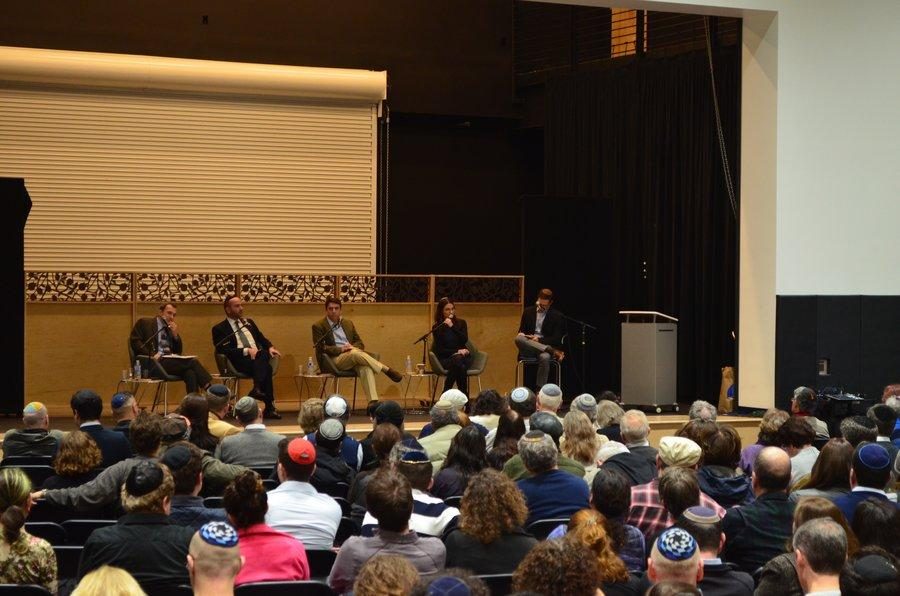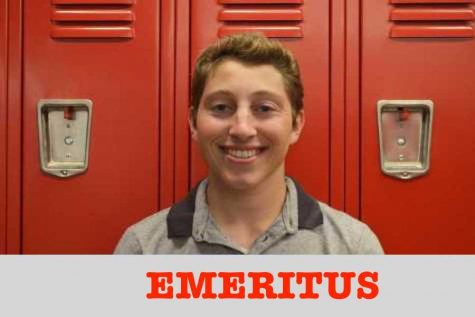Cross-denominational discussion hosted by Institute
Hundreds gathered inside the gym on a Saturday night to hear rabbis agree and argue. From left, Rabbi Yosef Kanefsky, Rabbi Pini Dunner, Rabbi Adam Kligfeld and Rabbi Sharon Brous, with Rabbi Schwarzberg.
February 1, 2016
What do you get when you cross a Conservative, Progressive and two Orthodox rabbis on one stage? The Shalhevet Institute’s enthusiastically attended “Community conversation: an evening of discussion and dialogue,” which turned out to be so cordial that it lacked a cynical punchline.
Roughly 300 people packed into the Shalhevet gym on Saturday Jan. 9 to listen to their rabbis verbally spar with the others on pressing Jewish issues, while sipping on wine and enjoying cheese, crackers and fruit.
But Rabbi Sharon Brous of Ikar, the Progressive synagogue that meets at Shalhevet on Saturdays, seemed to speak for everyone wen she said unity and uniformity were two different things.
“I don’t believe, and I’m not the first person to say this, that unity means uniformity,” said Rabbi Brous. “I think while we all know that intellectually, what frustrates us most in this internal Jewish conversation is really a lack of uniformity — which is not actually something we really want.”
Rabbi Brous shared the spotlight with Rabbi Yosef Kanefsky of B’nai David Judea, Rabbi Adam Kligfeld of Temple Beth Am and Rabbi Pini Dunner of Beverly Hills Synagogue. Each was were asked questions by Judaic Studies teacher Rabbi Ari Schwarzberg, who had planned the event as director of the Shalhevet Institute.
All of the other rabbis agreed on this idea. But some of the evening’s few sparks flew over the meaning of the word mesora — tradition — in Judaism today. Rabbi Kanefsky’s suggested that the word should take a break from being used.
Halacha, he said, sometimes needs to change, and it’s wrong to use the concept of tradition as a reason to make change impossible.
“Mesora, when the term is appropriately understood, appropriately used, doesn’t mean it can’t be right,” said Rabbi Kanefsky. “When conditions and moral religious considerations change and evolve, so must halacha. That is the substance of mesora.”
Rabbi Dunner and Brous joined in.
“When you are part of a corporate body, it is not just about the me or all the individual me’s,” said Rabbi Dunner. “It’s about action, showing a deference to a system which preceded the me in me and which will last beyond the me which is me.”
Rabbi Brous compared tradition to a scaffolding, reminding us not to be too caught up in its details but instead to remember its purpose.
“The problem I think emerges when we become so focused on the details of the scaffolding that we forget that the scaffolding was put in place in order to hold and make place for something holy to emerge,” said Rabbi Brous.
She said communities should balance traditional rituals with moral action.
“There are communities that are obsessed with moral action and communities that are obsessed with ritual action, but we’ve completely forgotten that our tradition holds and calls for and demands from us the marriage of these two,” Rabbi Brous said.
Rabbi Kligfeld took a stance in the middle and said that mesora is not set in stone, but it must be respected.
“If we pass [to future generations] something which is brittle, it’s going to break by the time the third person touches it,” said Rabbi Kligfeld. “And if we pass something malleable and soft it’s going to have everyone’s finger prints on it, its going to have the bouquet, stench and the imperfections and the canonized mistakes of everyone who has touched it from Sinai until now.”
Near the end of the evening, Rabbi Schwarzberg asked whether there was a correlation between the views of liberal Jews and left-wing Zionists, and conservative Jews and right-leaning Zionists.
Rabbi Dunner spoke first.
“My primary concern as a Jew is the preservation of the Jewish nation and Judaism,” said Rabbi Dunner. “I don’t see how concessions to Palestinians can allow for a Jewish nation to exist in that territory.”
In contrast, Rabbi Brous criticized some of Israel’s behavior.
“We are risking undermining our own existence by some of our behaviors in Israel and this is something that the Jewish community in America is complicit in,” said Rabbi Brous. “We don’t stand up and speak up enough insisting that there is in fact a Jewish way to engage our neighbors, a Jewish way to engage in war.”
Although an audience question and answer period was scheduled, there was time for only one question due to timing. The event did not conclude until close to 10:00 p.m.
Shalhevet senior Jonah Gill had enjoyed the evening.
“The idea of the cross-denominational conversation intrigued me,” said senior Jonah Gill. “Overall I thought it was a really interesting and a well done night.”
Rabbi Schwarzberg had explained his goal for the event in his opening remarks.
“We are trying to create a learning community that seeks serious study of talmud Torah, serious study of Jewish literature, in a manner that allows for ideas, conversation and religious meaning,” said Rabbi Schwarzberg.
It seemed he had succeeded, During the discussion, Rabbi Kligfeld praised the event.
“I think these are the nights,” Rabbi Kligfeld said, “that are the harbingers of the messianic era.”














